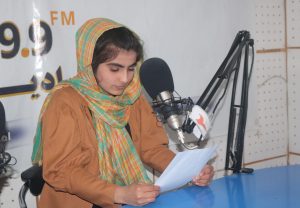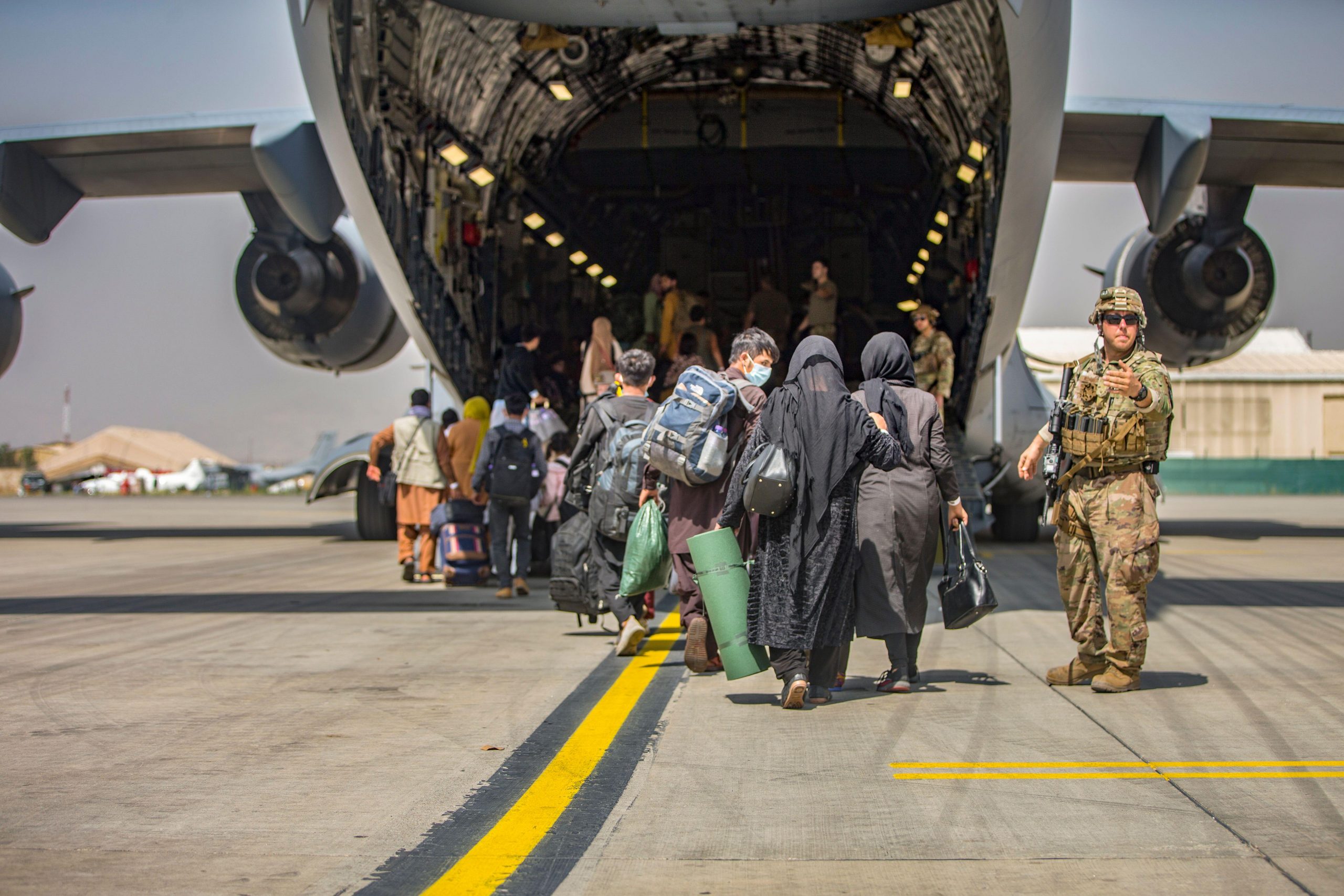[vc_row][vc_column][vc_column_text]

An Afghan female journalist hosts a radio program at the radio-television channel Ghazal, April 7, 2021.
Mohammad Jan Aria/Xinhua/Alamy Live News
For five days after the fall of Kabul to the Taliban insurgency, Mariam (not her real name) didn’t leave her house. As a professional athlete, this was very unusual. However, 23-year-old Mariam is also one of the city’s up and coming journalists and staying at home did not feel right.
The militant group, known for their regressive ideology and restricting women’s rights and freedoms, had forced many Afghan women to retreat in to the shelter of their homes in the days following the siege. But Mariam had enough. “I wanted to get back to work. I wanted to get out,” she said.
So on Friday, an otherwise normal day off in Kabul, Mariam decided to go to her workplace, a newsroom in the centre of the city. “Around 11.45 am, as I was getting into the car, I got a call from an unknown number. I answered it and the man on the other line, asked, ‘Are you Mariam?’ and I froze in my tracks.”
“He sounded friendly, as though we might have been old friends,” she said.
But something about his voice made her very uncomfortable. Still, she replied, “Yes I am.” He then asked her, “Do you know me?” and she replied, “I don’t and I don’t have your number saved either. Who is this?”
Without answering her question, the man continued, this time in a much less friendly tone. “He identified the location of my office and asked if I worked there. I was so scared, I didn’t reply. He then said, ‘We [the Taliban] are coming for you’ and I immediately hung up and put my phone on airplane mode.”
Mariam is not alone.
In her short career as a journalist and TV presenter, ‘Marzia’ has received many threats from insurgents as well as fundamentalist groups who disapprove of her work in the media. As a woman and as a member of Afghanistan’s persecuted Hazara ethnic group, she was no stranger to threats, but they were always a world away from her vibrant and empowered life in Kabul. Until, that is, the country fell into the hands of the Taliban on 15 August.
‘Fauzia’, another Afghan female journalist, said: “Of course there were challenges of being a journalist in Afghanistan; it was never easy. But I could deal with those because we had platforms, and more importantly, we had the media, to help us fight for our rights.” Fauzia is currently on the run due to the threats she has received.
The Taliban seized control of the majority of the country earlier this month, including the capital. The Afghan president along with many top government officials were forced to flee after being asked to resign on the pretext of creating a transitional government. The militants, however, have taken control of the capital and large parts of the country creating panic and chaos among those who have been outspoken critics of the Taliban.
Since the fall, there has been a rush of Afghans trying to escape the country to avoid persecution from the Taliban who are known to be vengeful. The Journalists in Distress (JID) network, a collaborative effort of media support organisations like the Committee to Protect Journalists (CPJ) and the International Women’s Media Foundation (IWMF) are working in collaboration to evacuate Afghan journalists to safety.
Nadine Hoffman, deputy director of the IWMF said: “The race to evacuate Afghan media workers and their families has been the most challenging and complex emergency the press freedom community has faced. Conditions on the ground, particularly at the Hamid Karzai International Airport, have made this gargantuan task feel at times insurmountable.”
“Those individuals we are supporting to evacuate have faced extreme physical duress; they have been beaten, shot at, and threatened in their homes by the Taliban. It is heartbreaking to watch this tragedy unfold. Women journalists voices in Afghanistan are being silenced.”
In a statement on Monday, the CPJ shared that they had registered and vetted the cases of nearly 400 journalists in need of evacuation, and is reviewing thousands of additional requests. Other organisations have similarly large lists of media persons seeking safe passage out of Kabul.
In a press conference held the day after the fall, Taliban spokesperson Zabihullah Mujahid assured that media will remain independent but said the journalists “should not work against national values”. However, despite the group’s assurance of a full amnesty to those who work in media and the previous government, Afghan journalists do not trust the terror group with a history of violence against the Afghan media.
Already, several journalists have reported being threatened by Taliban members across the country. Meanwhile, the CPJ also documented multiple attacks on the press from the Taliban in the last week, including physical attacks. A female state TV anchor was also forced off the air, underlining the Taliban’s lack of commitment to protecting the rights of journalists.
Several at-risk journalists shared that the Taliban had been visiting their homes collecting information on “those who worked with infidels” and warned that action would be taken later, implying this would happen after the complete withdrawal of foreign forces from Afghanistan.
“We knew sooner or later they would come looking for us so we destroyed all our documents, certificates and IDs that show our work with the Americans,” said a journalist from Nangarhar province, ‘Sahar’. “It was the body of my lifetime of achievements, and I set it all on fire,” she added, the grief evident in her voice.
However, it did little good, as the Taliban came to Sahar’s neighbourhood armed with biometrics devices seeking to identify people with data that was shared with the previous government. “They haven’t come to our house yet. I know they will kill me. They have already killed some of my friends,” referring to the journalists assassinated in March in Jalalabad.
Sahar’s fears are not unfounded. Taliban fighters killed the relative of a Deutsche Welle (DW) journalist on Thursday, while looking for him during a similar door-to-door search as described by Sahar. “They shot dead one member of his family and seriously injured another,” DW reported.
Earlier this month, unidentified gunmen shot and killed Toofan Omar, the owner of Paktia Ghag Radio. Officials in Kabul said Omar was targeted by the Taliban due to his work.
Last month, the group killed and mutilated the body of Danish Siddiqui, an Indian journalist working with Reuters, in Spin Boldak in Kandahar province.
Notably, of the total seven journalists killed in Afghanistan this year, four have been women, highlighting the increased risks women in media like Mariam, Fauzia and Sahar face. Already, earlier this year, the Afghan Journalists Safety Committee reported that nearly 20 per cent of Afghan women quit the media due to the threats they faced. The Afghan media watchdog reported that at least nine provinces in the country had no female journalists employed in the media, essentially depriving women’s voices and presence in the national debate.
These figures are feared to have risen considerably in the last week. “Soon there will be no one left to tell the story of Afghanistan,” Fauzia remarked.
After the call Mariam received on Friday, she made a decision she never thought she would ever have to make. Choking back tears, she said. “I decided to leave my homeland; a country I had previously wanted to serve.”
“I went back home, packed a small bag and left for the airport with my sister. We got on the first plane they [offered]. I don’t even know where we are going but I know we can’t live there.”
[All names of journalists in this article have been changed to protect their identities.][/vc_column_text][/vc_column][/vc_row]





